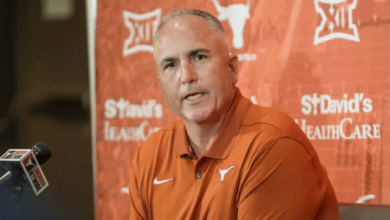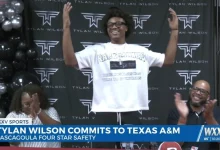Clemson Adds Soccer Star Charlie Reed – Could He Be the Next Antonio Gates?
When Clemson announced the addition of Charlie Reed, a highly-touted soccer star, to their football roster, it raised eyebrows across the college sports world. The move seemed somewhat unorthodox at first, given Reed’s background in soccer and his relatively limited exposure to the game of football. Yet, as the news continued to gain traction, so did the excitement surrounding his potential. Fans, analysts, and coaches alike began to ask an intriguing question: could Charlie Reed be the next Antonio Gates?
For those unfamiliar with Gates’ story, it’s one that defied conventional wisdom. A star basketball player at Kent State, Gates never played a down of college football but found himself signed by the San Diego Chargers in 2003 as a tight end. His incredible athleticism, basketball background, and sheer determination allowed him to become one of the most dominant tight ends in NFL history, proving that exceptional athletes could make the leap from one sport to another. Now, with Reed’s move to football at Clemson, many are wondering whether he could follow a similar path—using his soccer background to become an elite tight end in college football, and perhaps even beyond.
Reed’s journey into football is an interesting one. He was a standout soccer player known for his speed, agility, and vision on the field. These attributes—natural gifts that helped him dominate in soccer—are exactly the types of traits that translate well to football, especially at a position like tight end. Standing at 6’5” and weighing in at around 220 pounds, Reed already possesses the size and athleticism necessary to be successful on the gridiron. However, transitioning from soccer to football is no small feat. While the physical tools are there, football presents a different set of demands—technical, mental, and physical—that Reed will need to learn quickly if he hopes to make an impact at Clemson.
One of the most compelling reasons people are drawing comparisons between Reed and Gates is the idea of positional versatility. In soccer, Reed was a forward, often playing in a central role where he could read the game, make runs, and create scoring opportunities. This kind of spatial awareness, ability to read defenses, and knack for positioning himself in the right spots are all transferable skills that can serve him well as a tight end. Tight ends in modern football are no longer just blockers. They are often the linchpin of an offense, capable of both catching passes and contributing to the running game. Gates revolutionized the position, combining his basketball skills to become a mismatch nightmare—creating separation with his agility and utilizing his physicality in contested catches. In a similar way, Reed’s soccer background gives him the potential to become a multi-dimensional tight end, someone who can run precise routes, box out defenders, and potentially stretch the field for Clemson’s high-powered offense.
The skill set that Reed honed in soccer is already proving valuable. His ability to read the field and make quick decisions under pressure was a cornerstone of his success on the pitch, and it will be similarly crucial on the football field. Soccer players are constantly thinking two or three steps ahead, whether it’s anticipating a pass, positioning themselves to take a shot, or finding space in crowded areas. This type of cognitive ability could help Reed adjust to the fast-paced and strategic nature of football, particularly at a position where timing, angles, and route running are crucial. Reed’s footwork, something that is essential in soccer, will also be a massive asset as he works to develop his skills as a pass-catcher and blocker. The fluidity and precision required for soccer footwork translate directly into making sharp cuts and executing crisp routes on the football field.
Despite all the natural gifts Reed brings with him, there’s no denying that football will require him to develop a new set of skills. While Reed has the size and athleticism, football’s physicality is a whole different animal. Soccer, though it can be physically demanding, does not prepare athletes for the kind of collisions and contact they’ll face on a football field. As a tight end, Reed will need to learn blocking techniques, develop strength and leverage, and gain a deeper understanding of offensive schemes and defensive coverages. The transition will not be immediate, and Reed will likely need time to adjust to the speed and intensity of college football.
It’s also worth noting that Reed is coming into one of the most successful and competitive football programs in the country. Clemson, under the guidance of head coach Dabo Swinney, has consistently been a powerhouse in college football, producing NFL-caliber talent year after year. The expectations at a program like Clemson are sky-high, and while Reed’s raw talent is undeniable, he will need to adapt to the level of competition that comes with playing at one of the top programs in the country. The pressure will be immense, but Swinney and his coaching staff are known for their ability to develop talent and get the best out of athletes, regardless of their background. If anyone can help Reed make the transition successfully, it’s Clemson’s coaching staff, which has shown time and time again their ability to turn highly athletic players into elite performers.
Clemson’s history of turning multi-sport athletes into stars is also encouraging for Reed’s chances. The program has long had a reputation for recruiting and developing athletes who might not necessarily fit the traditional mold but possess the physical tools and mental acuity to succeed. Players like former wide receiver DeAndre Hopkins, who excelled in multiple sports growing up, are proof that with the right coaching and mindset, athletes from various backgrounds can thrive in the world of college football. Reed’s situation is similar—he’s not just a raw athlete; he’s someone with years of high-level competition under his belt, and he’s shown an ability to excel when pushed.
The potential for Reed to follow in Gates’ footsteps hinges on a few key factors. First and foremost, Reed’s work ethic and willingness to learn will determine his success. Like Gates, Reed must embrace the challenge of transitioning to a completely different sport. Gates had to learn how to play tight end from scratch, relying on his physical tools, basketball instincts, and a sharp learning curve. For Reed, the willingness to absorb coaching, develop his football IQ, and put in the necessary physical work will be critical to his success.
Another key factor is his ability to stay healthy and adjust to the physical demands of football. Injuries are always a concern for athletes transitioning from one sport to another, especially when it comes to football’s high-impact nature. Reed’s conditioning from soccer will certainly help him adjust, but he’ll need to work hard on building strength, improving flexibility, and learning how to protect himself when taking hits. Football is a much more physically demanding sport, and Reed will have to adjust to the rigorous practices, the weightlifting, and the constant strain on his body.
Lastly, Reed’s mental approach to the game will be just as important as his physical talent. Football, more than many other sports, is as much a mental game as a physical one. Reading defenses, adjusting to schemes, and understanding the subtleties of play design require a high level of football IQ. Reed’s ability to grasp these concepts quickly and apply them on the field will determine how successful he is in his transition. With a coaching staff like Clemson’s, it’s reasonable to expect that Reed will be given the tools he needs to succeed in this area, but it will ultimately be up to him to take full advantage of the opportunity.
For now, it’s hard to predict exactly what Reed’s future holds in college football. His transition will likely take time, and he may not make an immediate impact on the field. However, his potential is undeniable. The comparisons to Antonio Gates aren’t made lightly—Reed has the physical gifts, the work ethic, and the mental acuity to make a similar leap. Whether he becomes the next great tight end in college football or takes a different path remains to be seen, but the fact that Clemson is giving him the chance speaks volumes about his potential.
As with any athlete making a bold transition, Reed’s story is one to watch. College football has always been a place where new stars emerge, and if Reed can harness his talent and work ethic, he could very well become a key figure in Clemson’s offense. The comparisons to Gates will continue to be made, but Reed’s journey will be uniquely his own. Whether or not he can become the next Antonio Gates, one thing is certain: Charlie Reed’s future in football has a lot of promise, and it will be exciting to watch him develop into whatever role he ultimately carves out for himself.









